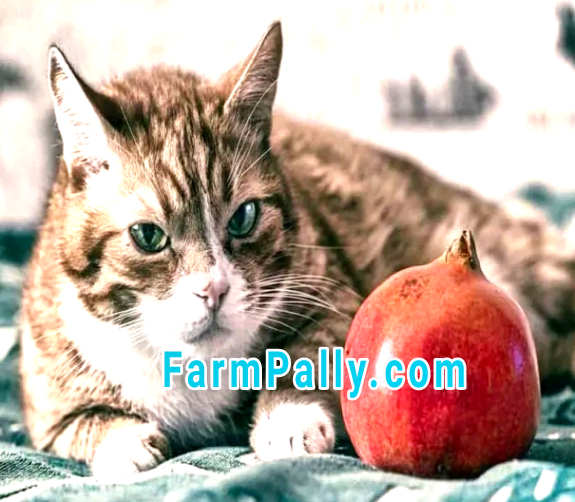Pomegranate is an edible fruit that’s packed with nutrients. It’s one of the human foods and fruits edible for pets like cats.
Both the edible part, the peel or rind, leaves and the seeds of pomegranate are not poisonous to cats.
Does it now mean that cats can eat pomegranate leaves, seeds or peel without issue? No!
Like in most fruits, the rind and leaves may contain some compounds in a concentrated form which can upset the stomach when ingested.
Think of oranges and pawpaw for example, the rind can upset the human stomach when ingested while the fleshy part can be consumed without issue.
Are Pomegranate Rinds, and Leaves Poisonous to Cats?
Yes, pomegranate peel and leaves contain higher concentrations of tannins, alkaloids, ellagitannins such as punicalagin, and other phenolic compounds which are harmful to cats when ingested in large amounts.
The compounds found in the plant parts are astringent, irritant, and difficult to digest for cats.
Can Cats and Kittens Eat Pomegranate Seeds?
No, adult cats and kittens should not be allowed to eat pomegranate seeds.
Although pomegranate is not classified as a poisonous food for cats, it should be taken with caution.
According to ASPCA, and other Animal care organisations, Punica granatum (Pomegranate) is not listed among the lethal toxins for cats.
Pomegranate tissues are nutrient-rich, the edible part – seeds and juicy aril are high in sugars, fibre, and antioxidant polyphenols such as the ellagitannins and the anthocyanins.
However, since cats are obligate carnivores, and their digestive system is adapted to animal proteins, fibrous fruit or concentrated plant polyphenols can be toxic, and most fruits’ hard seeds can be indigestible for them.
Therefore, cats should not be allowed to eat large quantities of pomegranate seeds, and for kittens, it should be totally avoided.
Since the rinds, seeds, and leaves can cause choking and mechanical obstruction for cats, leading to nausea, vomiting or diarrhoea, and possible organ failure in the future, most cat parents are cautious of their cats eating pomegranate on their own.
Symptoms of Pomegranate Poisoning in Cats
Interestingly, most cats pass by pomegranates. But some cats are curious in nature, they tend to sniff the fruit, and when they take a bite, some don’t have the seeds.
When cats eat pomegranate fruit with the seeds, the most common symptoms are mouth irritation, vomiting, drooling or loose stool which last in a day or two days.
If they ingest a large amount of seeds, leaves or arils, it can cause abdominal discomfort, loss of appetite, restlessness, breathing difficulty, and blood stool, and lead to total breakdown.
Cats rarely eat pomegranate leaves because they’re less palatable, and more likely to cause immediate GI upset or oral irritation.
Kittens’ reaction to pomegranate ingestion can last longer, hence the reason I advised total avoidance.
If vomiting or diarrhoea continue after two days, you notice difficulty in breathing or other serious concerns, you should consult your veterinarian immediately.
Do Cats like Pomegranate Smell?
No, Many cats don’t like the Pomegranate smell. They sniff it and just turn away.
But like differences in humans, some cats enjoy sniffing everything they see even if it’s edible for them.
What to do if your cat eats a pomegranate?
Like I’ve said, pomegranate fruit is not toxic, and cats would not eat leaves and peels normally, so your cats eating pomegranate with the seeds once in a while is not a call for panic.
Your feline companion should act normally, and if there’s stomach upset, it should subside in a short time.
If your cat is showing worrying signs like the above-mentioned symptoms, don’t panic, and do not induce vomiting, just call your cat’s doctor for control.
